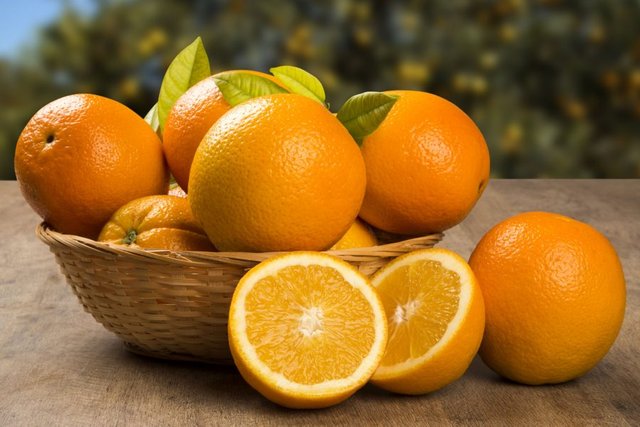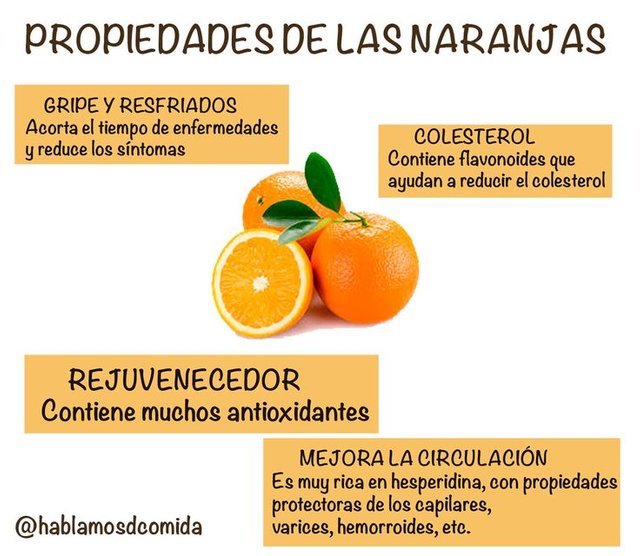ORANGE
The orange is the fruit of the sweet orange tree, a tree that belongs to the genus Citrus of the family of the Rutáceas. This family comprises more than 1,600 species. The botanical genus Citrus is the most important of the family, and consists of about 20 species with edible fruits, all of them very abundant in vitamin C, flavonoids and essential oils. The fruits, called hesperides, have the peculiarity that their pulp is formed by numerous vesicles full of juice.
The sweet orange tree is the most cultivated of all citrus, being the most important species of the genus Citrus. After her they are followed in importance by their closest relatives: mandarins, lemon, grapefruit, limeros and kumquats. Do not confuse the sweet orange with the bitter (Citrus aurantium L.), cultivated since ancient as ornamental tree and to obtain fragrances of its fruits.  Nutritional properties
Nutritional properties
Its nutritional composition highlights its low energy value, thanks to its high water content and its richness of vitamin C, folic acid and minerals such as potassium, magnesium and calcium. The latter is hardly absorbed by the body. It contains appreciable amounts of beta-carotene, responsible for its typical color and known for its antioxidant properties; In addition to the malic, oxalic, tartaric and citric acids, the latter potentiates the action of vitamin C. The amount of fiber is appreciable and this is found mainly in the white part between the pulp and the bark, so its consumption promotes intestinal transit.
Vitamin C intervenes in the formation of collagen, bones and teeth, red blood cells and favors the absorption of iron from food and resistance to infections. Provitamin A or beta carotene is transformed into vitamin A in our body as it needs it. This vitamin is essential for vision, the good condition of the skin, hair, mucous membranes, bones and for the proper functioning of the immune system. Folic acid intervenes in the production of red and white blood cells, in the synthesis of genetic material and the formation of antibodies of the immune system. Potassium is a mineral necessary for the transmission and generation of the nerve impulse and for normal muscle activity, it intervenes in the water balance inside and outside the cell. Magnesium is related to the functioning of the intestine, nerves and muscles, is part of bones and teeth, improves immunity and has a mild laxative effect. The malic and citric acids have a disinfecting action and alkalinize the urine.  Composition per 100 grams of edible portion
Composition per 100 grams of edible portion
Calories 36.6
Carbohydrates (g) 8.9
Fiber (g) 2,3
Potassium (mg) 200
Magnesium (mg) 15.2
Calcium (mg) 41
Vitamin C (mg) 50.6
Folic acid (mcg) 38.7
Beta-carotene (provitamin A) (mcg) 49
mcg = micrograms
- Properties for health
Oranges, thanks to their pleasant flavor and their refreshing properties, constitute one of the main table fruits, and are very popular and consumed by the entire population. Orange juice is usually the first fruit flavor tested by babies, and from 5 months onwards, it is the only supplementary contribution of vitamin C to the diet, among other nutrients. They have an ideal size for individual consumption and their skin protects the pulp and prevents the interior from spoiling, so they have the advantage that they can be taken anywhere and consumed at any time of the day.
The orange and its juice are excellent source of vitamin C, flavonoids and beta-carotene, so this fruit is considered especially interesting for cardiovascular health. These substances have an antioxidant function; they inhibit the oxidation of the so-called "bad cholesterol" (LDL-c) and prevent it from depositing on the walls of the blood vessels and thus preventing atherosclerosis. These substances have antioxidant capacity; Combat the harmful action of free radicals, substances responsible for the development of cardiovascular, degenerative and cancer diseases.
A medium orange or a glass of juice cover practically 100% of the vitamin C recommendations, which are 60 milligrams for an adult person. However, there are situations that increase the requirements of this nutrient: smoking, alcoholism, taking certain medications, pregnancy and lactation, stress, diminished defenses, intense sports practice, cancer, AIDS, infectious diseases and chronic inflammatory diseases. , like rheumatism.
In these cases, the habitual consumption of oranges is particularly recommended. And for the rest of the population, eating them, can bring more benefits during the winter months and seasonal changes, when ups and downs in the defense system are frequent, and you are prone to get colds or infections. Other vitamins
Because of its abundance in folic acid, essential vitamin in the processes of division and cell multiplication that take place in the first months of pregnancy, the consumption of oranges is especially interesting for pregnant women, although its acid composition can cause heartburn to pregnant women with the delicate stomach.
In case of iron deficiency anemia, it is very useful and advisable to consume this fruit accompanying iron-rich foods or supplements of this mineral. Vitamin C markedly increases iron absorption and this speeds recovery.
The orange and especially its juice, exerts a choleretic and cholagogue action. Taken on an empty stomach they can cause a sudden emptying of the gallbladder that is accompanied by mild discomfort such as nausea or abdominal heaviness. These discomforts are not serious, although they explain the fear of many people to take orange juice on an empty stomach. Actually they are the result of an intense cholagogue action of citrus, and in case of suffering from cholelithiasis, this can trigger a colic, so in this case, the fasting consumption of orange or its juice is discouraged.
IF YOU WANT TO HAVE MORE DETAILED INFORMATION, YOU CAN VISIT THE PAGE HERE I LEAVE YOU THE LINK http://frutas.consumer.es/naranja/propiedades